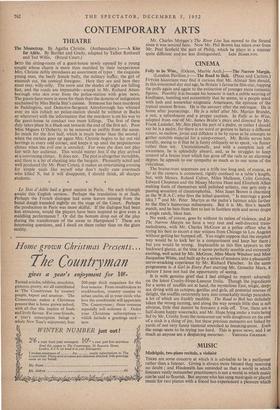CONTEMPORARY ARTS
THEATRE
Ism the sitting-room of a guest-house newly opened by a young couple whose charm is more than matched by their inexperience Mrs. Christie deftly introduces an assortment of types • the exquisite young man, the beefy female bully, the military buffer, the girl of mannish cut, the comical foreigner. Here they are and here they must stay, willy-nilly. The snow and the shades of night are falling fast, and the roads are impassable—except to Mr. Richard Atten- borough who skis over from the police-station with grim news. The guests have more in store for them than the demons of indigestion unchained by Miss Sheila Sim's cuisine. Someone has been murdered in Paddington, and Detective-Sergeant Attenborough has whizzed over on skis (which no police-station should be without in Bucks or wherever) with the information that the murderer is on his way to the guest-house to conduct two more killings. The , first of these duly takes place in a black-out towards the end of the first act. Poor Miss Mignon 0 'Doherty, to be removed so swiftly from the scene. So much for the first half, which is much better than the second ; when the curtain goes up again Mrs. Christie begins to lay out red herrings in every odd corner, and keeps it up until the preposterous climax when the evil- one is unveiled. For once she does not play fair with her audience. This would matter less if the play arrived at a convincing climax. It does not. The plot is altogether incredible, and there is a bit of cheating into the bargain. Pleasantly acted and well produced (by Mr. Peter Cotes), it makes an entertaining evening for simple souls like myself who don't really care overmuch who killed X, but it will disappoint, I should think, all sharper students.
Le Don d'Adele had a great success in Paris. No such triumph awaits this English version. Perhaps the translation is at fault. Perhaps the French dialogue had some leaven missing from the banal dough kneaded nightly on the stage of the Court. Perhaps the production in Paris was more skilful. If the dialogue had been less atrocious, would the players have been inspired to give even a middling performance ? Or did the bottom drop out of the play during the transference of the scene to Hampstead ? These are Interesting questions, and I dwell on them rather than on the glum reality. Mr. Charles Morgan's The River Line has moved to the Strand since it was noticed here. Now Mr. Phil Brown has taken over from Mr. Paul Scofield the part of Philip, which he plays in a manner quite different and no less distinguished. IAD/ HAMILTON.


















































 Previous page
Previous page